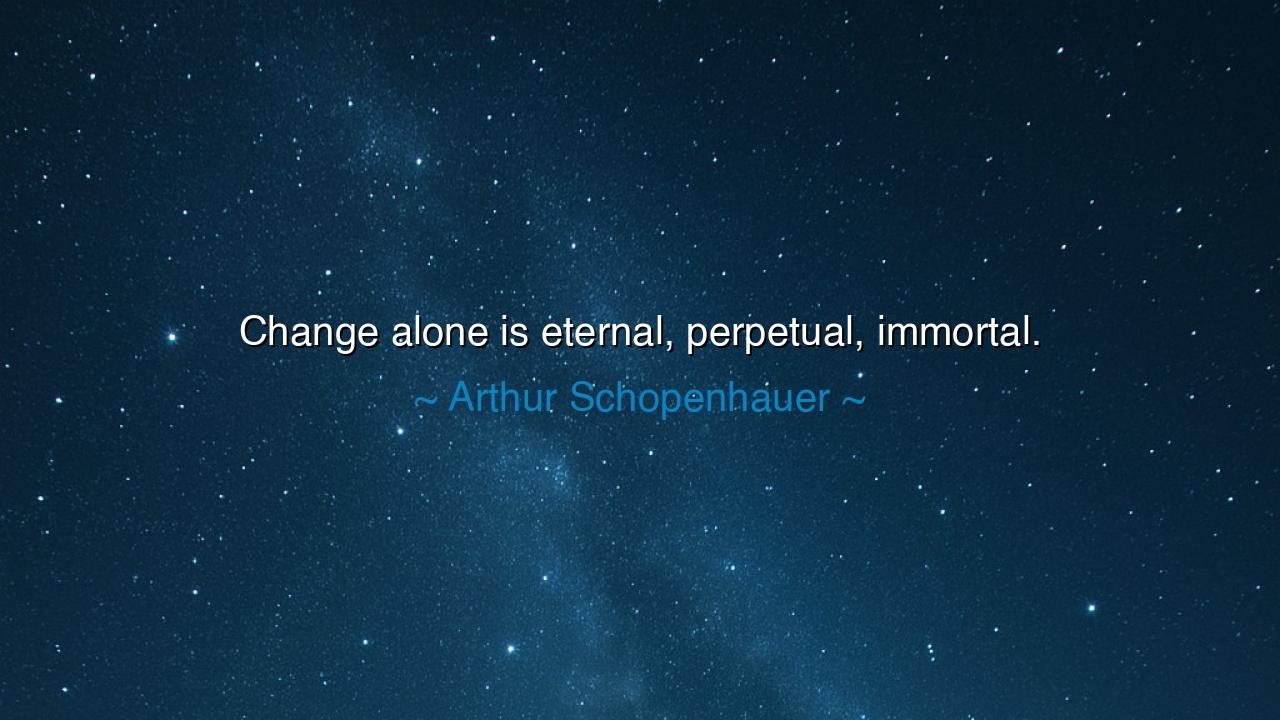
Change alone is eternal, perpetual, immortal.






In the solemn and eternal voice of Arthur Schopenhauer, the philosopher who gazed deeply into the abyss of existence, we hear this profound truth: “Change alone is eternal, perpetual, immortal.” These words echo not merely as philosophy, but as the heartbeat of the universe itself. In them, Schopenhauer gives form to the law that governs all creation—that nothing stands still, that every atom, every star, every thought, and every life is bound to the rhythm of transformation. What we call birth and death, gain and loss, joy and sorrow, are but waves upon the same eternal sea of change.
Schopenhauer, the philosopher of will and suffering, lived in an age when mankind began to see the world through new eyes—when science was uncovering the hidden motions of nature and reason was dethroning the old certainties. Yet his insight reached further than science. He saw that change was not only in the stars or in the body, but in the very essence of being. To exist is to move; to live is to transform. Everything fixed decays; only the flow endures. Even the soul, he thought, is a ripple in the great current of the cosmic will—restless, striving, forever becoming. Thus, in proclaiming change as eternal, Schopenhauer revealed the paradox of life: that permanence is an illusion, and it is only through transformation that existence persists.
To the ancients, this truth was already sacred. The Greek philosopher Heraclitus, long before Schopenhauer, declared, “You cannot step into the same river twice,” for the waters are ever flowing. The river remains, yet the water is never the same—just as we remain ourselves, yet are never unchanged from moment to moment. The Buddha, too, taught this under the name anicca, the impermanence of all things, warning that suffering arises when we cling to what must inevitably change. And so Schopenhauer’s words are not a lonely reflection of one man’s melancholy—they are the modern echo of an ancient truth, the wisdom of all who have seen the world as it truly is: a ceaseless dance of becoming and passing away.
To see how this truth unfolds in the fabric of life, look upon nature. The seed dies that the flower may bloom; the flower withers that the fruit may be born; the fruit falls that another tree may rise. Even the mountains, those ancient giants, are ground to dust by wind and water, and from that dust new earth is born. So too in the history of humankind—empires rise and fall, civilizations perish, and from their ashes, new dreams take root. When Rome crumbled, it seemed the world had ended; yet from its ruins, Europe was reborn. The eternal is not the city, nor the crown, nor the empire—it is the force of renewal that moves through them all.
But the same law that governs the stars also governs the heart. Within each human soul, change is the source of growth. The child becomes the youth, the youth the elder; our thoughts evolve, our loves deepen or fade, our dreams shift like the seasons. Those who resist change, who cling to the ghosts of the past, find themselves broken by the turning of time. But those who embrace it—who learn to move with its current rather than against it—become wise. They discover that change is not the enemy of life, but its very condition. To live well, then, is to accept that transience is not loss, but the means by which beauty is renewed.
Consider the life of Nelson Mandela, who spent twenty-seven years in the stillness of a prison cell. The world outside him changed, and within that solitude, he too was transformed. When he emerged, he did not seek vengeance, but reconciliation. He understood, as Schopenhauer did, that no state—whether of suffering or of triumph—endures forever, and that through change comes healing. His life became a testament to this eternal principle: that even when all else is stripped away, the power to grow, to evolve, to begin anew, remains immortal.
The lesson, then, is this: do not fear change, but revere it. For it is the only constant, the silent god who shapes all destinies. When joy fades, know that new joy will come. When loss strikes, remember that life is already moving toward renewal. To fight change is to fight the pulse of existence itself. Instead, meet it with courage, and let it make you wiser, gentler, and more alive.
So, O seeker of wisdom, when the winds of change sweep through your life—when the familiar crumbles and the unknown rises—do not despair. You are not perishing; you are being remade. The stars themselves are born from the collapse of dying suns, and so it is with the soul. Accept, therefore, the truth that change alone is eternal, and walk in harmony with it. For in yielding to transformation, you will touch the immortal heart of all things—the pulse that beats forever through creation, through loss, and through the endless, ever-renewing wonder of life.






AAdministratorAdministrator
Welcome, honored guests. Please leave a comment, we will respond soon